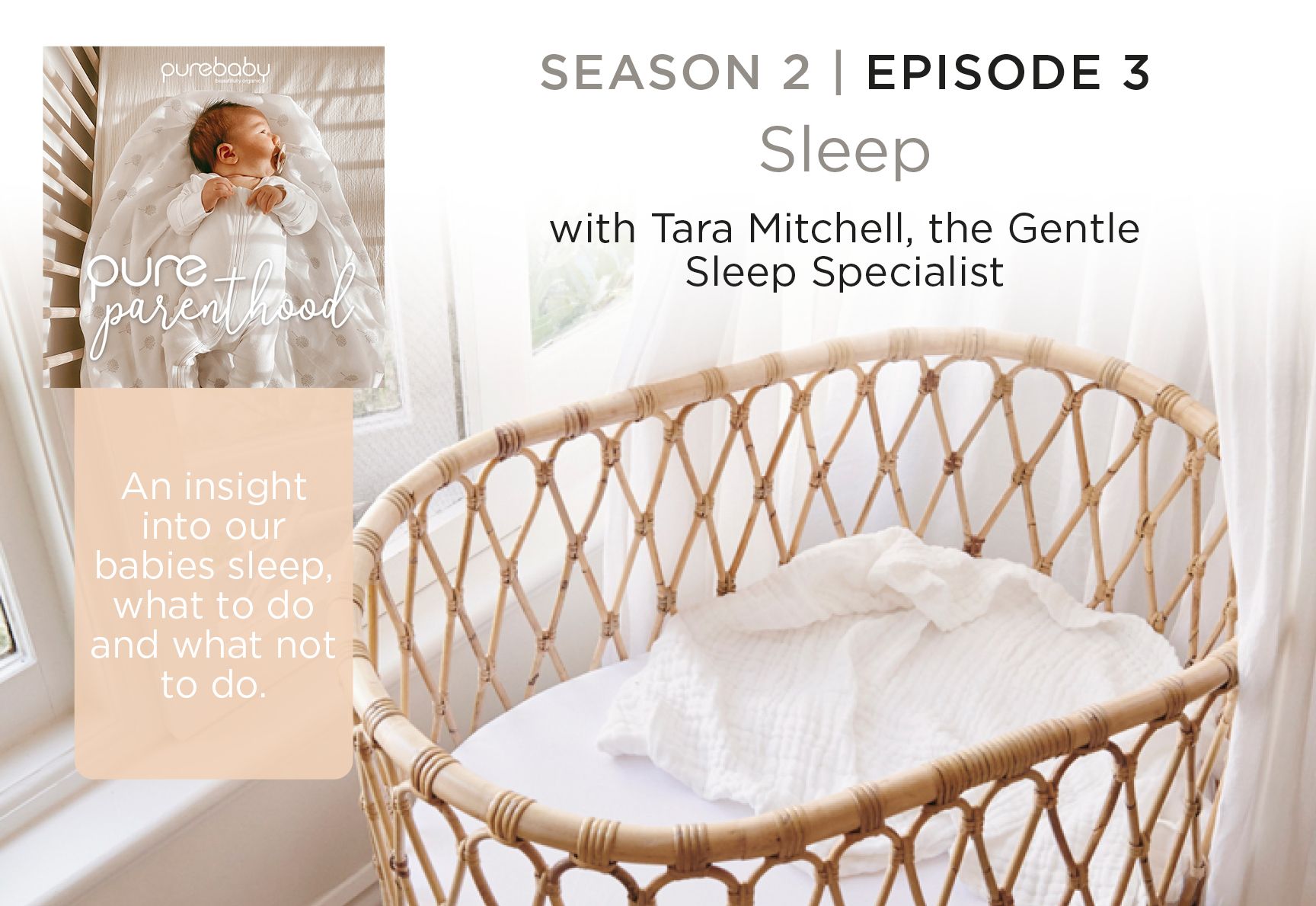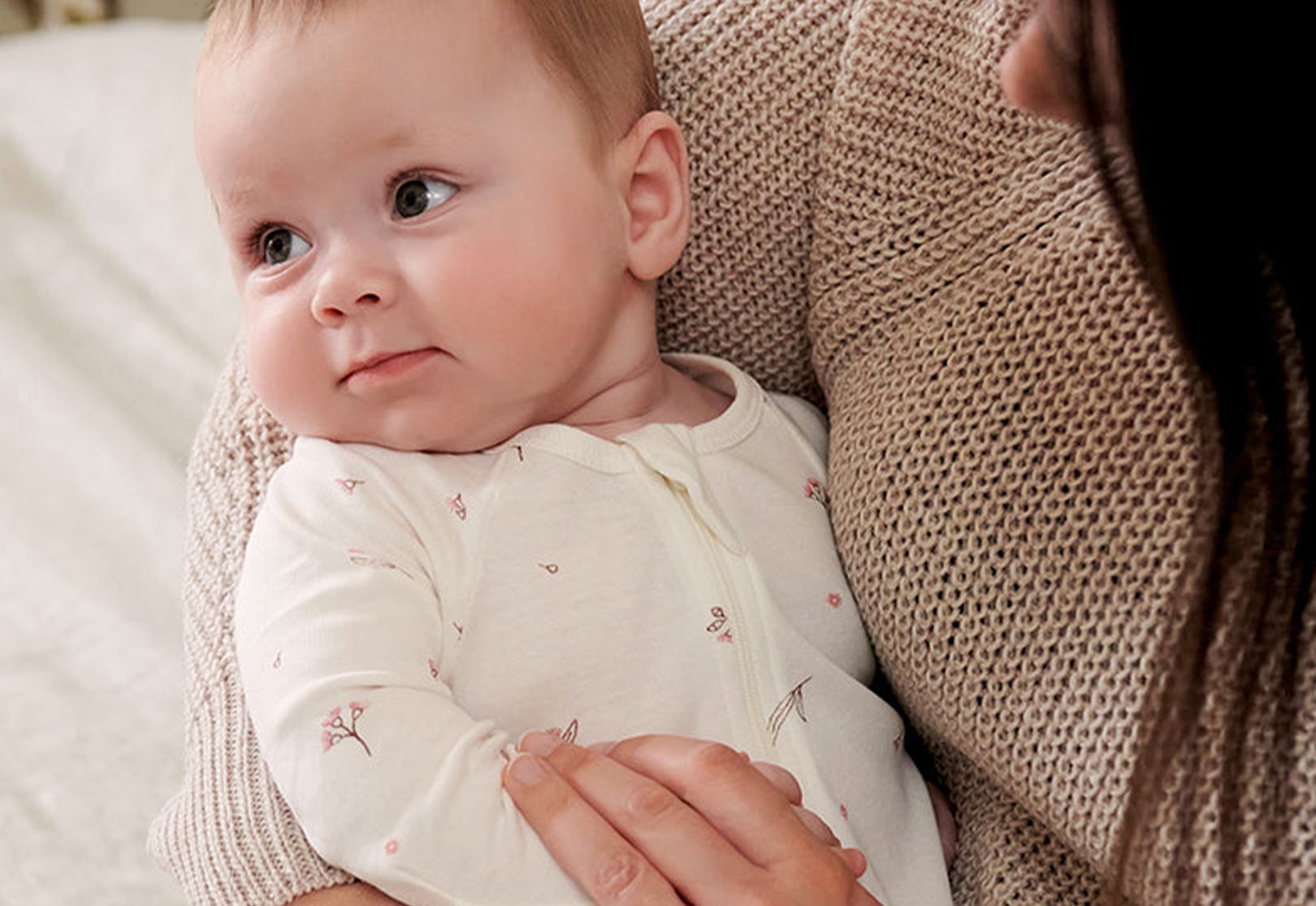
Why Sleep Is Important for Babies
12 min read | 14 March 2021
New In
Essentials
Clothing
Accessories
Shop By Gender
Shop By Size
Collections
Baby
Clothing
Accessories
Shop By Gender
Shop By Size
Collections
Nursery
Care
Play
Kids
Clothing
Accessories
Shop By Gender
Shop By Size
Collections
Care
Play
Gifts
Baby Gifting
Kids Gifting
Shop By Price
Shop By Event
Shop By Gender
Sale
Sale
Shop By Gender
Learn
Education
Resources
Pre-Loved
Rewards
12 min read | 08 August 2022

Sleep regression is when your baby sleep pattern changes, typically as they grow and develop, causing them to wake up during the night. Babies with sleep regression often have trouble falling back asleep, which in turn means, you, the parent experience interrupted sleep as well.
Sleep regressions can be caused by a few different factors, typically they are cognitive or developmental/physical in nature. Sleep regressions in general don’t typically have to equate to poor sleeping. I like to think of them rather than regressions as your little one’s milestones that they experience as they grow and learn. Let’s take a look into the 4, 6, 8, 12 month and two-year sleep regressions.
At four months your little one has a change in their sleep cycles, their sleep cycles start to mature and become more adult like in length and of nature. They can go between 60, 90, to 120 minutes in length. Once these sleep cycles change in length it becomes a mechanism for your little one’s safety, to check in-between each cycle that everything is as it was when they fell asleep. It is when your little one’s environment or the way they have fallen asleep has now changed to when they initially fell asleep that you tend to get a lot more callouts to come and recreate what they know to fall back asleep again.
For example, if your little one relies on external measures such as rocking, dummy, etc. to get to sleep, they will also give you the call out at the end of these cycles to come and help them back to sleep again. So, it is normal for your little one to awaken more towards the end of each sleep cycle. However, ideally with a few changes, they should be able to drift straight back into the next sleep cycle themselves. Unless they are due for a feed, of course.
At this age it is typically more of a separation anxiety/cognitive leap for your little one. Basically, they become more aware of the big world around them. Surges of cognitive development will happen throughout your little one’s life and it can present in different ways.
For some it may affect sleep, for others it may not, some may become clingy or irritable during these periods, others not. It is normal for your little one to experience separation anxiety at this point as they have now learnt object permanence which means they are aware you are separate to them and that when you leave you continue to exist even though they cannot not sense your presence.
Firstly, don’t try to trick or sneak away from your little one. It is okay that they have this period of learning and that may bring some discomfort, but our job is not to make sure we never allow them to experience that. I Instead, support and guide them that you will return and that everything is ok even during this change. You can create a little bit of a goodbye routine, however, don’t drag it out. Keep it confident and positive. If you notice particular words you say on your goodbye make it worse, then mix it up a little.
Practice games where you disappear and then come back again.
Don’t shy away from opportunities or commitments that mean you are separated, leaving your little ones with a familiar and safe caregiver for example a partner or grandma is completely ok.
Try to avoid big changes at this time and be mindful if you begin to play new rules around sleep that these may become new habits and possibly problematic in time ahead.
Don’t try and change too much, be confident, support a little more but know that this will pass usually within 2 to 3 weeks.
Huge developmental changes! Your little one is busy practicing many skills, there’s a lot going on both physically in terms of development but also cognitively. It is really important at this point to make sure that your little one gets plenty of opportunity to practice their skills. If they are in the pram or a car a lot they may use their time in bed to practice their skills instead:
Plan to have time at home where they can just be and they can practice
Try not to begin new habits around sleep as mentioned before, be confident in putting your little one down to bed, check they’re not over or under tired
It is okay if your little one is now not lying in a particular middle spot of the cot, let them move around and explore
If your little one is on their knees rocking or starting to sit up, don't feel like you need to rush in to fix this, give them plenty of opportunity to try and lay back down themselves
Allow them autonomy around these new skills in their safe sleep space
At 12 months your little one is walking the walk and talking the talk, or at least trying to. Communication, cognitive and physical leaps are coming in leaps and bounds at this point. Your little one is now beginning to communicate, they are also using their larger muscles. Physically they are navigating walking and the sudden open environment this brings to them.
This can be a number of things, first things first remember you now have a toddler which means you are navigating boundaries plus significant vocabulary and physical leaps. Toddlers need boundaries and it is important that you and your partner are on the same page, not just at bedtime, but with boundaries and navigating toddlerhood in general.
Be sure to give them plenty of opportunity to have playtime
Try not to overschedule your days
Allow them to be bored and use their imagination
Allow time for play and plenty of outdoor time to use those big muscles and expend the energy that is bountiful at this age.
Be mindful of second winds that they might get before bedtime if they have screen time or too much downtime, they can essentially recharge and this makes settling much harder. Be consistent and confident with boundaries and know that it’s okay for a little one to not necessarily like all of them.
At two years of age it is not the best time to move your little one to a big bed, this can open a huge can of worms instead focus on keeping boundaries and bedtime a confident, fun time of their day. Be mindful of their bedtime routine becoming too late, with one request after another. This can be really overwhelming for them come the evening. Break it up, keep the lead up to bedtime full of connection, fun and interaction.
First things first, it is really important to check their awake times are on track, do they need a little more? Often people just go straight to blaming regressions when simply, it’s that their awake time hasn’t been adjusted for some time and so they begin to fight sleep. On the same note, make sure your little one hasn’t lost their sleep pressure having lots of time on feeds, being very drowsy in the lead up to bedtime or on milk feeds which can eat away at your little ones need for sleep. Once you adjust their awake time make sure that during that time they are engaged, playful and expending that energy.
How are your little ones sleep habits in general? For those who have inconsistent sleep or poor sleep habits even the smallest of things can derail their sleep further, self settling can lead to far better outcomes during regressions and much less problematic regressions in general. Getting on top of their sleep habits and working on sleep patterns can make such a significant impact when it comes to regressions plus the brunt of regressions tends to be far less.
Most sleep regressions last between 2-6 weeks during this time, try to avoid big transitions, keep things familiar and predictable.
During regressions particularly physical and cognitive leaps your little ones' awake time may need to be lessened just slightly, I would also keep an eye on their solid intake and see if that needs upping too.
Try not to play new roles, if your little one isn’t used to you being in the room while they fall asleep or being held, etc. try not to begin during these times. You can check in more frequently and be more present but offer comfort not necessarily fixing to sleep.
Allow plenty of time to practice these things during the day, plenty of one on one time, loads of eye contact and time to play. Really soaking up that time so they don’t feel like they need to catch up on these things during the night time.
This article was written by Tara Mitchell from the Gentle Sleep Specialist.
Sign up to Pure Love Rewards and get $10 off your first online order, earn points every time you shop and more!